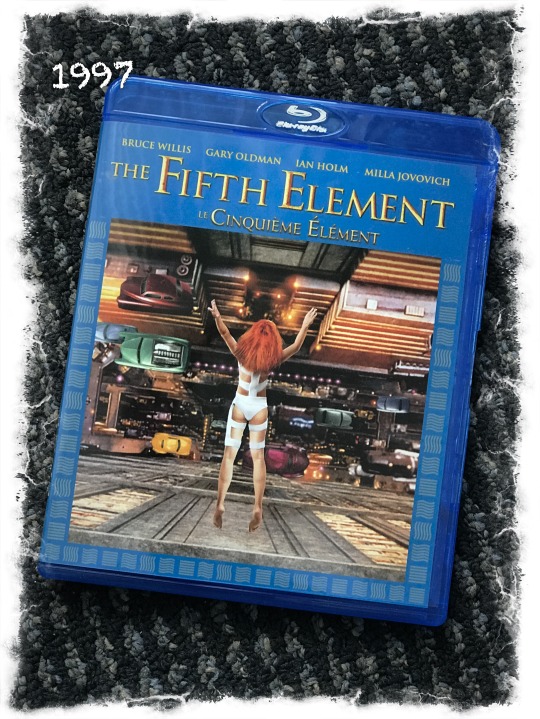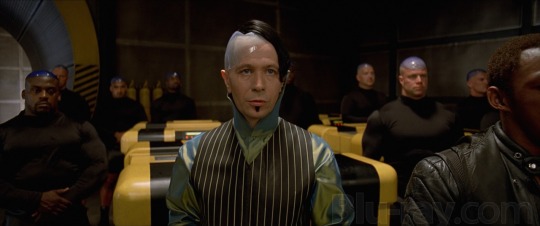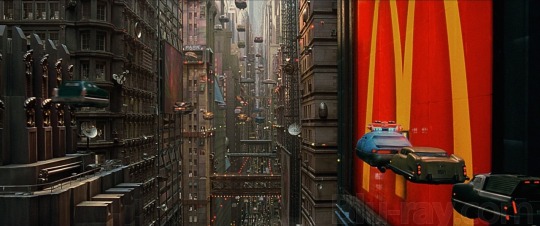#asian ruby tucker?? we love to see it
Text
The Fifth Element (1997)
It’s easy to forget that SF Thrillers can be FUN!! After the dark, cynical, Kafka-esque worlds of Blade Runner, Gattaca, Total Recall, Contact, Brazil, Minority Report, and 12 Monkeys — brilliant though they all are in their own ways — something fun can feel like a breath of fresh air! For those who doubt the fabulous of this film, remember this: it was selected as the opening film for the 1997 Cannes Film Festival. No, really, it was!
Luc Besson wanted to show the future is not dark and dangerous. "This future is very funny." - CITE

There are moments in this which are, quite frankly, insane. This is good. This is to be encouraged. But Chris Tucker’s character is problematic to me: DJ Ruby Rhod is clearly a satirical commentary on the Celebrity Culture where Cultural Icons and Influencers are famous for being Celebrities. His self-obsessed character is an entirely logical conclusion of today’s reality culture. He’s hyper-sexual and hyper-fashionable and just plain hyper-active. So... Why does he also have to be hyper-effeminate? Is the rest not already sufficient? Apparently, Prince was the first choice for the role, but It’s unlikely he would have been so effete. Everything else which makes the character works perfectly, that last aspect just seems like they’re going for the cheap laugh at the expense of ‘teh gays.’ Ugh.
The explosion towards the end of the film in the Fhloston main hall is suitably impressive. Given that this was the largest indoor explosion ever filmed, the resulting fire almost went beyond control, taking twenty-five minutes to put out, and it resulted in massive damage of the Albert R Broccoli 007 soundstage at Pinewood Studios, one would expect nothing less.

At one point early-on, the evil corporate master Zorg [Gary Oldman, above] provides a short lecture promoting the “Broken Window Fallacy,” demonstrating just how deeply embedded his evil is. We’ve already seen him fire one million cab drivers in a stroke, as well as sell the collective souls of humanity for some unspecified — but clearly insane in scope — sum of money. His justification for doing these sorts of things is quite terrifying. In the scene, he is accused of being someone with whom the Priest would never cooperate.
Zorg: What's wrong with me?
Priest Vito Cornelius: I try to serve life. And you seem to want to destroy it.
Zorg: Oh, Father. You're so wrong. Let me explain.
[Puts an empty water glass on his desk]
Life, which you so nobly serve, comes from destruction, disorder and chaos. Now take this empty glass. Here it is: peaceful, serene, boring. But if it is destroyed…
[Pushes the glass off the table. It shatter on the floor, and several small machines come out to clean it up]
Look at all these little things! So busy now! Notice how each one is useful. A lovely ballet ensues, so full of form and colour. Now, think about all those people that created them. Technicians, engineers, hundreds of people, who will be able to feed their children tonight, so those children can grow up big and strong and have little teeny children of their own, and so on and so forth. Thus, adding to the great chain of life. You see, father, by causing a little destruction, I am in fact encouraging life. In reality, you and I are in the same business.
This notion of ‘destruction creating productivity’ is a classic economics fallacy exposed in the essay The Parable of the Broken Window by French economist Frederic Bastiat in 1850 (originally titled Ce qu’on voit et ce qu’on ne voit pas or “That Which Is Seen and That Which Is Not Seen”). Taken to its logical conclusion, Zorg and other proponents of this idea would be going about merrily smashing everything in their sight in order to create jobs. They might even argue that the smashing of things would itself be a creation of jobs in order to accomplish the increase of smashing things. Setting aside the fact that it takes more time to make things than break things, there many things which rely on other things existing in useful states in order to make the other more complicated things. If, say, all champagne glasses are broken, how then does one make a champagne glass fountain? If there is a vast supply of polio vaccine, but no intravenous needles exist, how does one satisfy the demand for the product? This is an economic boon which cannot sustain itself.
This also reflects his short-sighted approach to the planet and its life: he has an all-consuming desire for as all the money which is available, but once he gains that vast treasure, the act which provides him with it also destroys his ability to spend it on anything worth the having of. To put it simply: He is an idiot.

There are many many parallels with Blade Runner, in addition to the inclusion of Brion James as General Munro. There’s the massively overpopulated New York City, the flying cars, the huge lighted billboards, the ease of access to Asian food with its proprietor providing information to the hero, and the all-powerful corporate owner who does what they want in any number of industries (sometimes replaced or supplemented with Government Agencies). Many of these come as part of the package with the “world of the future” trope, especially if aliens are involved; especially if ‘Alien’ is in the title somehow.
Yet here, inexplicably, these same elements are blended where we see the positive in the negative. As the restauranteur Mr Kim says to Korben Dallas: “Good philosophy, see good in bad, I like.” The writer and director of The Fifth Element, Luc Besson, has embraced this fully. Despite all this evil in the world, there are truly good people as well, which we see in Bruce Willis’ Korben Dallas, Maïwenn’s Diva Plavalaguna, Ian Holm’s Cornelius, and Milla Jovovich’s Leeloo (full name is "Leeloominaï Lekatariba Lamina-Tchaï Ekbat De Sebat"). Certainly, Gary Oldman’s Zorg is quintessentially evil, even psychopathically so, as he shows no remorse about getting what he wants is any way, but he is presented in such a way that this chaotic evil of his can have its knees knocked out from under it with humour, that power being immediately taken away from him in a Riddikulus spell-like moment. That ability to reduce the powerful illusion of the bad which is plaguing the world is something we need more and more it seems, and it would be excellent if we could find a way to have this skill in our all too real lives.
★★★★☆
0 notes